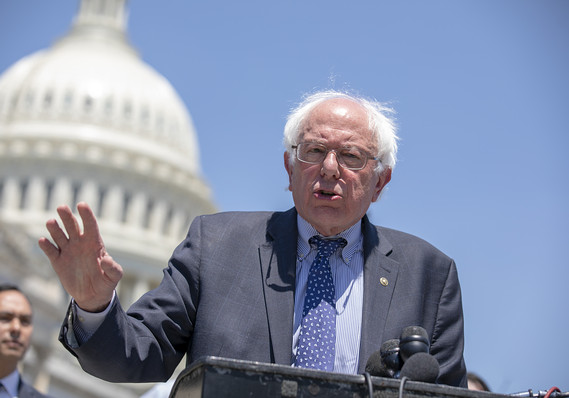 Getty Images
Getty Images
Sen. Bernie Sanders knows it’s an uphill challenge to convince Americans they can afford a government-run health-insurance program.
In introducing a new version of his health-care legislation, the Vermont independent and Democratic presidential candidate says, first, that Americans already are paying for trillions of dollars in health costs — to a combination of private insurers and the federal government.
Related: Bernie Sanders unveils new version of his ‘Medicare for All’ plan
An entirely government-run health-insurance program, as Sanders imagines, would by definition shift those costs onto the federal government.
A conservative group estimated Medicare for All would cost about $33 trillion over a decade. The Sanders camp didn’t come up with its own estimate but said the estimate from the Mercatus Group is inflated. The Congressional Budget Office has not yet scored Sanders’s legislation.
Regardless, Sanders did outline funding possibilities:
He suggests a tax both on the employee and employer sides. For employees, Sanders says there could be a 4% income-based premium paid by employees, exempting the first $29,000 in income for a family of four; for employers, a 7.5% income-based premium, exempting the first $2 million in payroll to protect small businesses.
From there, Sanders proposes a variety of progressive tax changes, including imposing a marginal tax rate of up to 70% on those making above $10 million, taxing earned and unearned income at the same rates, limiting tax deductions for filers in the top tax bracket, establishing a tax on extreme wealth and making the estate tax more progressive, including a 77% top rate on an inheritance above $1 billion.
Other ideas include closing a loophole that allows self-employed people to set up S corporations and avoid paying into Social Security and Medicare; imposing a fee on big banks; ending health tax expenditures; and “repealing corporate accounting gimmicks.”
The Sanders bill was co-sponsored by 14 Senate Democrats, including rival presidential candidates Cory Booker, Kirsten Gillibrand, Kamala Harris and Elizabeth Warren.
Shares of health insurers Cigna CI, -2.49% and UnitedHealth Group UNH, -4.31% were moderately lower, as Wall Street assigns minimal probability to the legislation becoming law.








